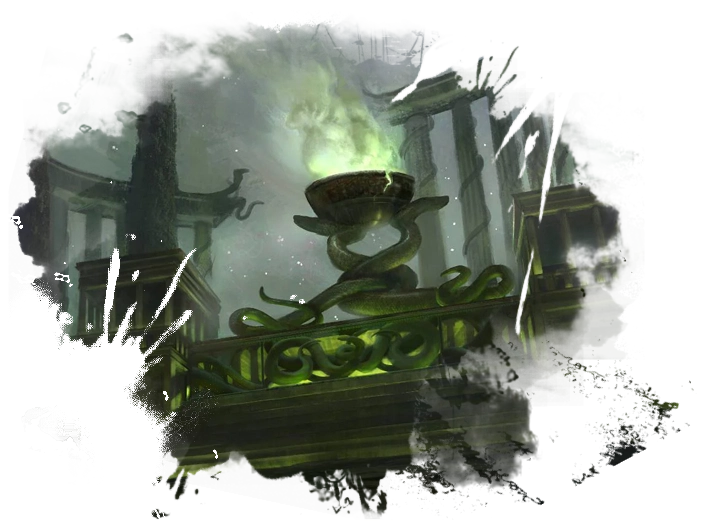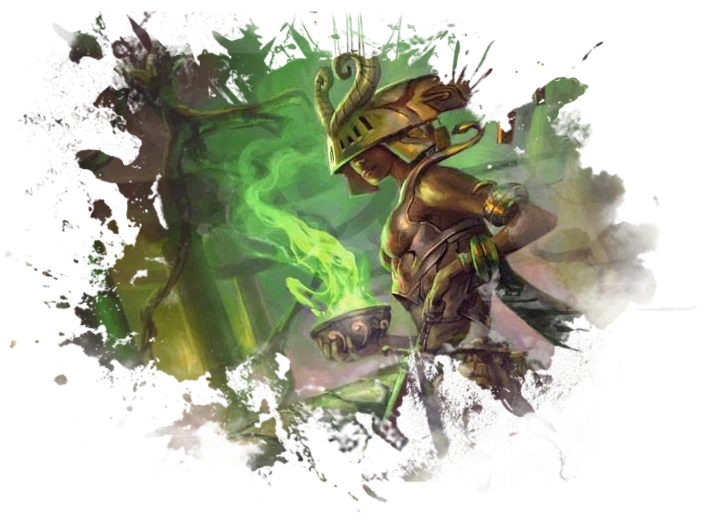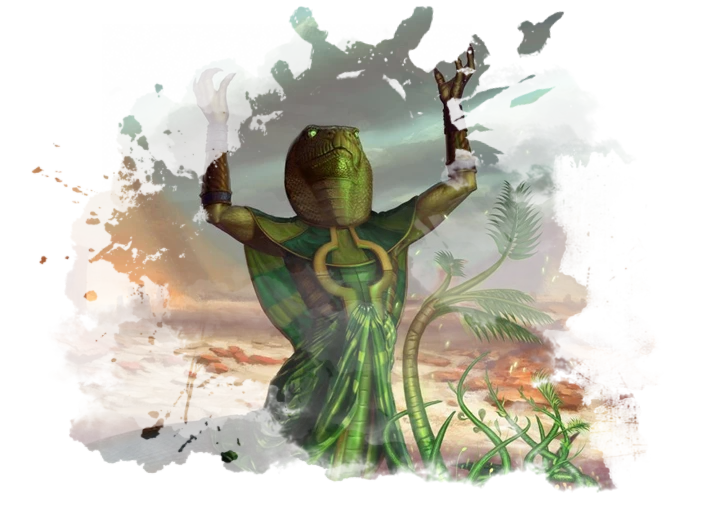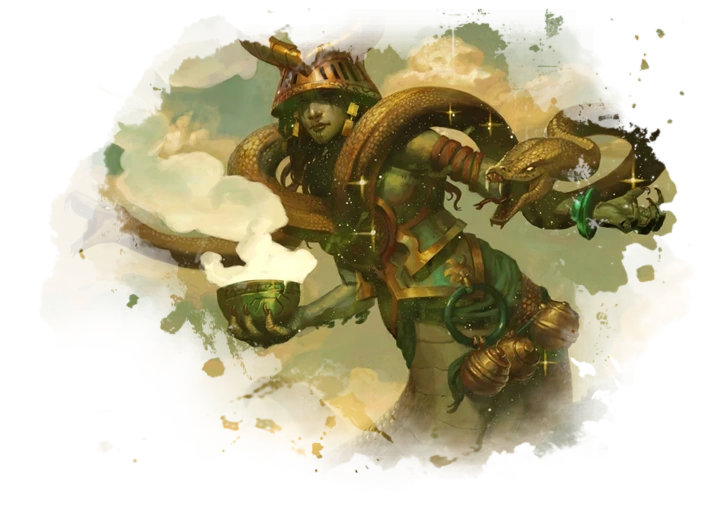Planar Encounters
Gorgons and
Naga are considered to be the direct children of Pharika herself. Pharika doesn't often travel to the mortal plane and is believed to influence serpents and basilisks to do her bidding in her stead, and finding one of these creatures in an unusual spot could be a sign from Pharika as a form of communication or of impending danger. Though serpents should not to be confused with Erebos' emissaries which are glimmering vipers and carry a much more foreboding omen. Dreams of serpents, sudden or random illness, or alchemical accidents have also been attributed to Pharika in some way or another.

Moss Viper by Mike Bierek
A possible omen from Pharika.
Temples and Shrines
Many alchemical labs could be considered as a direct shrine to Pharika or labs may contain smaller tributes to the goddess in the way of statues or dedicated mortars filled with medicines or poisons. More committed shrines and temples tend to appear more sinister with a lack of light, carved of solid stone and decorated with intricate carvings and bas-reliefs of an endless amount of snakes and serpents.
Usually at the hear of the temple is a large statue of Pharika, depicting her in her true form as a Gorgon, adorned with two snakes whilst holding a mortar. The mortal is often filled and replaced with fresh alchemical ingredients such as herbs. Instead of a statue, there could be a large brazier held up by metallic twin serpents decorated and set with jade stones and emeralds. The statue is usually surrounded by a deep pool of still water as a way for prayers to be answered by letters rolled up in ceramics and let sink into the depths. On either side of the statue are alters for making offerings and for performing rituals.
The Temples of Serpents, as they are often called, are quiet places of contemplation and reflections for worshipers of Pharika. It is a place where they can come to offer prayers and offerings to their deity, seek guidance and wisdom, and connect with the goddess of afflictions. The temple is also a place where non-worshipers can come to learn about the deity and the ways in which she influences the world around them. Many people come to these shrines to beg for mercy on behalf of themselves or their loved ones to lift certain illnesses or suffering. Alchemists offer tribute and prayer in the hopes that Pharika may bless their potions, and assassins much in the same way ask for their poisons to be potent.
The temple is guarded by a small order of priests and acolytes, who are dedicated to Pharika and the arts of medicine and alchemy. These guardians are knowledgeable in the use of remedies and toxic substances, and they use their knowledge to help those in need and to protect the temples and its secrets.

Temple of Malady by Titus Lunter
A shrine to Pharika.
Relationships
Pharika has a friendly relationship with
Phenax, God of Deception and
Erebos, God of the Dead. Phenex helps deceive the unworthy from obtaining her magical and medicinal secrets, while Erebos shares a cordial dominion of death and acceptance with her. Clerics may find it easier and possibly beneficial to devote faith between any of these gods.
Pharika also has a peaceful relationship with
Nylea, God of the Hunt from their mutual love of nature and Pharika's appreciation for her animals. The other gods pay her no mind, and she has no outstanding issues with any other god. Clerics will have no issues devoting faith to her and any other god.
Followers
Worshipers and followers of Pharika come in a wide variety of people and professions. Alchemists, assassins, apothecaries and healers will usually devote some faith to the God of Afflictions through some mean or another. Worship of Pharika is not inherently seen as a negative thing, though worship through the means of acquiring poisons or wishing grief or harm upon others will be looked at with suspicion at best from outsiders.
Lay Members
Lay members are those who have only recently joined the religion. They make up a majority of members and carry with them the least amount of power and the least important responsibilities. Joining as a Lay Member requires no trial or tribute as anyone is free to become part of the religious group and participate in what the religion has to offer.
Lay members are tasked with cleanup and maintenance of the temples and shrines, to clear out the old offerings once a week to make way for new offerings, and to retrieve the messages to Pharika from the pools of water at her shrines. They are to make regular offerings and prayers to the deity, either at the temples or their own personal shrines. Lay Members are encouraged to learn about Pharika, her edicts, and her teachings. Lay Members are also asked to help with community projects by caring for the sick and elderly, share their beliefs to others and spread dominion, and to provide any spare financial donations to the faith.
Initiates
Initiates are those who have taken the next step in their devotion to their faith, and are proving to be more than just a casual participant of the religion. Lay Members are offered this position when they have demonstrated their dedication by continuous participation of the religion and its events for at least a month, by offering a noteworthy sacrifice or donation, or by special recommendation by an Acolyte or higher ranking member. Upon reaching this rank, Initiates are given a fraction of Pharika's power as well as added responsibilities. An initiate must begin learning at least one of the Professional Skills offered by the faith and the Devotion Professional Skill.
An Initiate's duties would include the encouragement of more advanced studies of what the religion has to offer, by interpreting religous texts, attending classes and workshops, and participating in religious discussions. Initiates are also asked for more service at temples, such as helping to prepare for religious ceremonies and holidays along with assisting Priests and Acolytes in their duties. Initiates may also be asked to lead and mentor new Lay Members who show promise in their devotion to the faith.
Acolytes
Acolytes have proven to become a valuable core member to the faith and are gifted more access to Pharika's power. To become an Acolyte, the Initiate must become invited to a ritual trial that tests their knowledge and skills, and to demonstrate their commitment to Pharika. The trial can be taken in one of two areas, poisons or potions. An Initiate must have at least one of the offered Professional Skills of at least 30%, and a Devotion skill of at least 50% before they can become an Acolyte.
The poison trial involves either creating a specific poison through alchemy or other means, or by having an unknown poison or vemon applied to the Initiate whereby the Initiate must use their knowledge to identify what has been administered. In the former test, the Initiate is given all the ingredients and supplies they need and must make an acceptable poison that is specified by the Priest. The latter is only resolved when the Initiate correctly identifies the poison, all the while the dosage is increased until they give up or become unconscious where they are then cured of the poison through magic or potion.
The potion trial involves much of the same, where the Initiate must create a specific potion or cure through alchemy or other means, or identify the symptoms from the poison they are given and must identify what plants or herbs are required to cure the ailment. These tests are virtually the same as the poison trials.
Failing these trials a total of three times bars the Initiate from promotion. Upon promotion, Acolytes are given the responsibilities to help lead and prepare religious ceremonies and trials, mentor Initiates and Lay Members and provide services to the temples which may include helping manage finances, resources, and personnel. They are expected to set out and acquire alchemical ingredients through either buying them or searching for them in the wild.
Acolytes may requisition equipment and materials necessary to the faith. They can also request lower ranking members to provide any necessary support. In addition, they are paid a stipident to their status, and provided with living quarters with the other Acolytes in whichever temple they choose.
Priests
Priests of Pharika are the spiritual leaders of the faith and community. They are given a substantial amount of Pharika's power and influence within the religion. Acolytes are given this rank by a majority vote from the current priests and must pass another ritual trial, or by special recommendation by a High Priest. Priests are the face of the faith and must be natural leaders, very knowledgeable about their faith, and dedicate a significant amount of time, energy, and support to the religion as a whole. To even be considered for the position, an Acolyte must have at least one Professional Skill of the faith at least 50%, and their Devotion must be at least 75%.
Like the Acolyte trial, this ritual can be completed using the Acolyte's knowledge of potions or poisons. The Trial of Poisons requires the Acolyte to craft a specific poison, such as a toxin that affects only specific creatures, or a poison that causes hallucinations. The Trial of Potions requires much of the same thought, where the Acolyte must create a potion to heal a specific affliction such as a disease or injury. Both trials require the Acolyte to acquire rare materials and must include the tooth of a Basilisk gathered by the Acolyte themself, create the potion or poison with a designated minimum quality, and complete the task within a certain amount of time. If the Acolyte completes the task and meets or succeeds the minimum requirements, they are promoted to a Priest.
Priests promote the teachings of Pharika and offer guidance and support to the faithful. They administer the temples by overseeing the temple's finances, resources, personnel, and give their own sermons. Priests are responsible for teaching religious studies and knowledge to the lower members, and play a central role of leading and performing religious rituals and ceremonies. They are also expected to spread the domain of Pharika through public speaking engagements or by serving on religious committees and councils.
Priests may ask for any of the resources available from their branch of the religion. They can also recruit any or all lower ranked members of their community to provide support for their needs. However, unless these resources are used to further the religion as a whole, abuse of this power can lead to excommunication or demotion. They are paid a high wage and given their own shrine along with their own private alchemy lab complete with stocks of ingredients.
High Priests
High Priests of Parhika are the supreme spiritual leaders. They are the highest ranking members of the faith and are responsible for overseeing all apsect of the religion. They are given all of the powers that Pharika offers and have significant responsibilities and authority. To become a High Priest, the Priest must decide if they think they are worthy enough, and are given a rare and extravagant ritual ceremony.
The ritual is simple: the Priest must survive the bite of a basilisk. A basilisk's venom is extraordinarily potent and there have not been any known survivors aside of the High Priests. The bite at first causes intense acute pain and burning at the point of injection. The heartbeat and breathing of the victim becomes rapid, and is soon to experience nausea and vomiting blood. Blindness is common, and soon the victim will experience muscle weakness to the point of complete paralysis. Paralysis leads to convulsions and seizures, foaming of the mouth, then a coma, and eventual irreversible organ failure and death. This event takes place over the course within a few minutes to barely more than an hour depending on the individual.
The Priest will suffer the majority, if not all of these symptoms throughout the trial. The extreme suffering and grief is an expected part of being a true High Priest. The Priest ultimately die during the trial, but if the member has shown that he is worthy through to Pharika, through exceptional devotion, great sacrifice, consistent and worthy offerings, and a diehard commitment to not only the religion, but to the greater community, then Pharika will revive the Priest who is cleansed of all his afflictions. His soul will be directly linked to Pharika, and he will be considered worthy of the title of High Priest.
High Priests are considered the ultimate authority within the religion. They oversee all the development of the creed, and manage every ceremony and ritual. They play a central role in shaping the face and practices of the community and ensure the continued growth and well-being of the religion and its members. They decide on the construction of new temples and shrines, act as a direct intermediary between Pharika and the faithful, and represent the faith to the wider community. They are the speakers of Pharika.
High Priests have complete and total control of all the resources the religion has to offer. They are paid the most, and are often given their own temple to manage. Along with the highest quality alchemy lab, High Priests are given access to all of the religion's most valuable and rare materials to use at will.
The Chamipions of Pharika
The Venomlord, and the Pharika's Panacea are Champions of Pharika. They are masters of of their craft in poisons and potions respectively. Both were High Priests that have even gone above and beyond the calling required for their former titles. They have been given secretive knowledge of their trade, as well as exclusive access to Pharika's most guarded powers and the rarest of all alchemical ingredients. The Champions have innate control over any of Pharika's lesser creatures, and become completely immune to any poisons, diseases, and afflictions. They are considered the most devout and powerful of followers and carry out Pharika's will directly. Pharika may consider one as a Champion by demonstration of one's sheer devotion to her, and the absolute mastery of their craft.
The Venomlord is Daihla, a Gorgon. Pharika's Panacea is Vata, a
Naga.

Pharika's Mender by Peter Mohrbacher
Daihla, Venomlord

Ramunap Excavator by Joe Slucher
Vata, Pharika's Panacea
“A balm or a poison depending on how it is administered, and to whom."










Comments